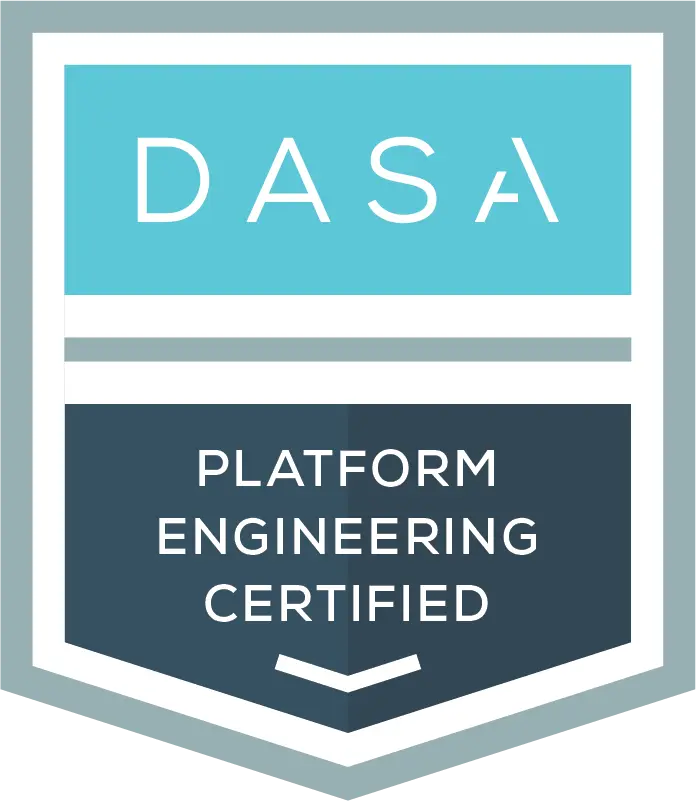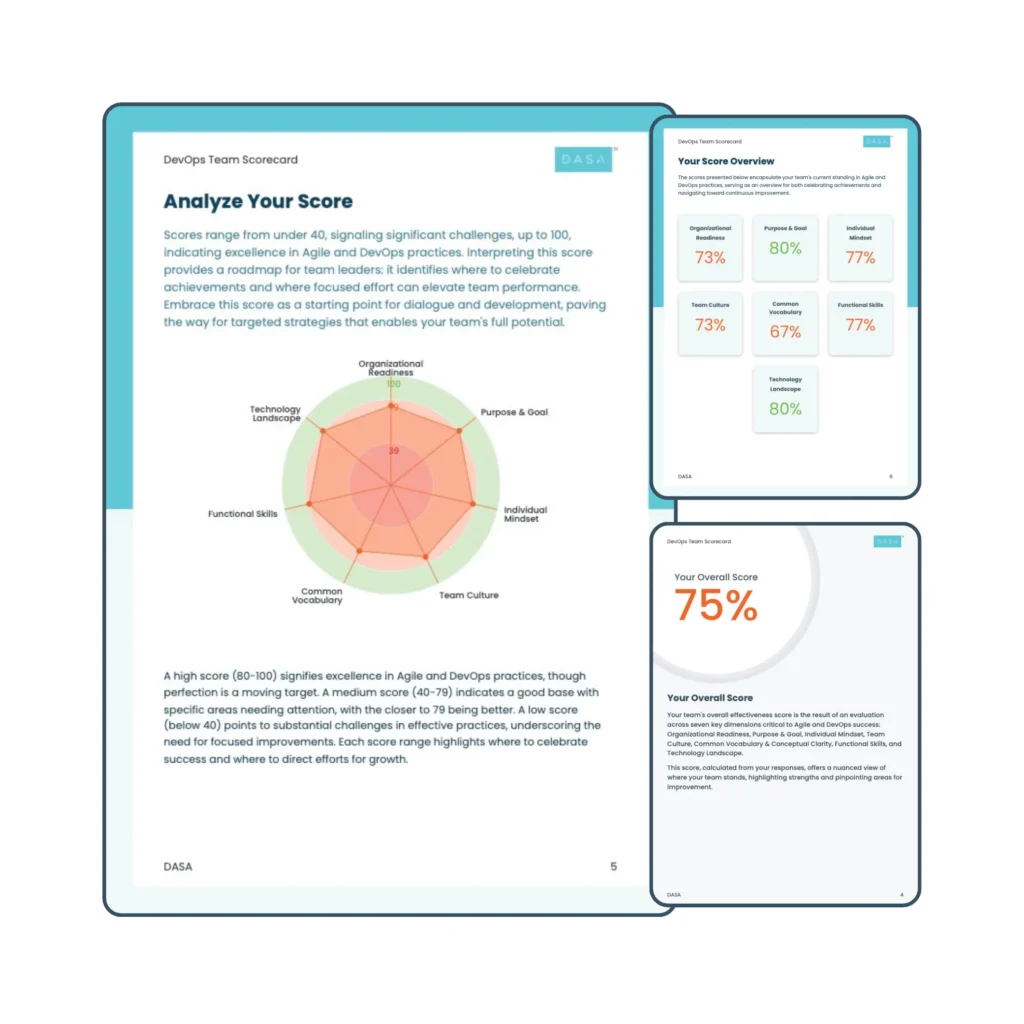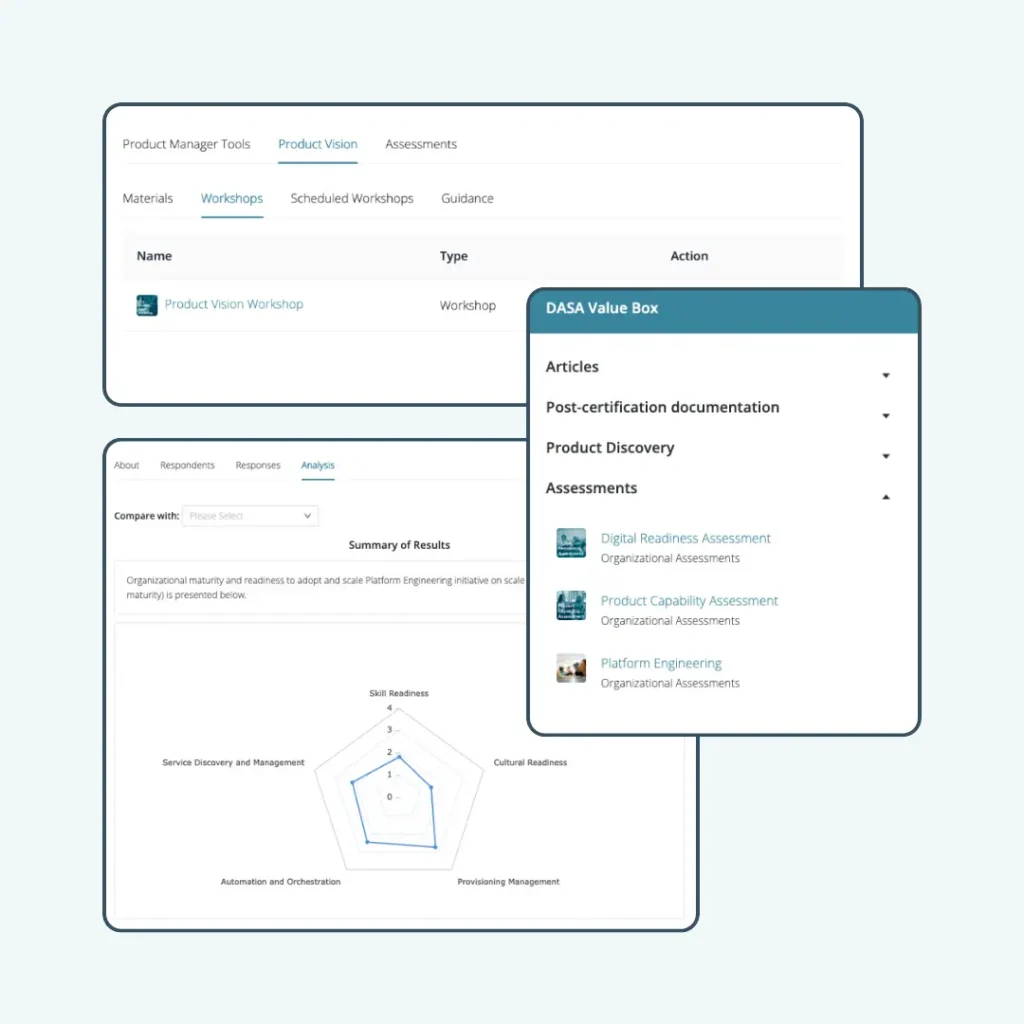DASA Platform Engineering Certification Program
Design and scale high-performance developer platforms. DASA Platform Engineering can help to seamlessly and effectively adopt platform engineering practices and capabilities within the organization. It enables teams to align the platform vision with organizational goals, treat the platform as a product, design an optimal developer experience, and maintain customer-centricity.
★★★★★
“This course is a great fit for platform engineers and leaders aiming to better align their platform strategies and tools.”
Certification Options

Contact us to get further information about upcoming courses and in-house training options.
or Explore Instructor-Led Training Options
Without Proper Platform Engineering, You Risk Falling Behind
Without proven platform engineering practices and a product-driven approach, your organization may face unreliable infrastructure, scalability issues, and rising costs. Without clear value realization, platform initiatives often fail to deliver results. Without the right skills, you risk being left behind as others drive innovation and maximize value from their platform initiatives—holding back your career in the process.
Prepare and De-risk Your Platform Engineering with Proven Best Practices
The DASA Platform Engineering Certification prepares your team to confidently execute platform initiatives by focusing on proven strategies that reduce risk and drive success. Eliminate uncertainty and avoid costly mistakes with a clear roadmap for platform engineering excellence.
Follow Proven Practices Trusted by the Best
Learn from trusted strategies that have been tested and proven in real-world platform engineering projects.
Eliminate the Risk of Costly Mistakes
Minimize errors by applying best-in-class approaches that ensure platform scalability, security, and compliance.
Prepare for Platform Engineering Success
Equip yourself with the knowledge and confidence to handle complex platform projects without relying on trial and error.
Maximize Value from Your Initiatives
Ensure your platform engineering efforts drive innovation and transformation by building scalable, stable, and resilient platforms.
Join a Movement of Professionals Driving Change
Future-Proof Your Career
Stay relevant and competitive by mastering Platform Engineering.
Boost Your Impact
Lead your team toward faster product delivery, innovation, and security.
Gain an Industry-Recognized Certification
Earn a credential that is trusted worldwide and recognized by top organizations.







Learning Objectives
After completing this program, you will be able to:
- Articulate the importance and requirements of Platform Engineering.
- Examine the relationship between DevOps and Platform Engineering.
- Align the Platform Engineering strategies with business vision and goals.
- Leverage your platform to promote and accelerate cultural shifts to ensure successful evolution of your DevOps transformation of platform engineering
in your organization. - Treat platform as a product.
- Develop a strategy for building the right developer experience.
- Create a strategy to use Infrastructure as code (IaC) in Platform Engineering.
- Illustrate how CI/CD is simplified with Platform Engineering.
- Explain the role of containerization in context of Platform Engineering.
- Comprehend best practices for monitoring, alerting, and incident response.
- Devise a plan for platform beyond the build.
Certification Details
Prerequisites
Basic familiarity with Agile, Scrum, and DevOps framework is beneficial.
Audience
Talent Development
- Leaders
- Managers
- Platform Engineers
- Software developers
- Platform Architects
- Product Owners
- Product Leaders
Course Curriculum
- Deciphering Platform Engineering
- Relationship between DevOps and Platform Engineering
- Stakeholder Management in Platform Engineering
- Accelerating DevOps Culture with Platform Engineering
- Platform as Product
- Building Developer Experience
- Infrastructure as Code in Platform Engineering
- CI/CD in Platform Engineering
- Role of Containerization in Platform Engineering
- Monitoring, Logging, and Incident Response
- Platform Engineering beyond Design & Development
Already DASA Platform Engineering? Update your LinkedIn Profile
Certification and Duration
| Certificate | DASA Platform Engineering |
| Duration in hours | 16 hours |
Exam Details
DASA delivers the Platform Engineering exams. The participants and training organizations can attain the vouchers for the exam through DASA.
| Delivery | Online Proctored |
| Format | Closed-book |
| Proctoring | Webcam |
| Duration | 80 minutes |
| Questions | 40 Questions |
| Pass Grade | 65% |
Scheduling Your Exam
Generally, your training partner will book the certification exam for you. If you have chosen an online self-study certification option you will be able to use the voucher provided with the training material.
Mock Exam
Certification courses include a mock exam. You can download the mock exam from your learning profile.
Accessing Your Certificate
All certificates and badges are issues through Accredible. You will receive an email with your download link in the days following your exam.

We Understand the Challenges of Staying Ahead
We understand how challenging it can be to manage complex platform engineering projects, especially when scalability, security, and reliability are on the line. That’s why we’ve helped thousands of professionals just like you gain the skills they need to thrive. With our globally recognized certification, you can rest assured that you’ll be learning from the best.
Business Benefits
Improved Operational Efficiency
Streamline processes and workflows, reducing downtime and boosting overall performance.
Increased Productivity
Empower teams to achieve more with optimized tools and automated tasks.
Scalability and Flexibility
Easily adapt to changing demands with a robust and adaptable platform architecture.
Enhanced Reliability and Stability
Ensure consistent, dependable performance with fewer disruptions and failures.
Innovation and Competitive Advantage
Foster a culture of innovation, staying ahead of competitors with cutting-edge solutions.
Faster Time to Market
Accelerate the development and deployment of new features and products.
Better Resource Utilization
Maximize the efficiency and effectiveness of your workforce and technology assets.
Increased Security & Compliance
Strengthen security measures and ensure adherence to regulatory standards.
Increased Developer Satisfaction
Enhance the developer experience, leading to higher morale and retention rates.
Here’s How to Get Certified in Platform Engineering
In 3 steps, you can gain the skills you need to lead the future.
Step 1
Enroll in the DASA Platform Engineering Certification Course
Choose what works best for you: join our instructor-led training sessions or bring the program in-house for a tailored experience.
Step 2
Learn and Apply Platform Engineering Principles
Master the principles that have been tested and proven to work, reducing the risk of mistakes and delays in your platform projects.
Step 3
Pass the DASA Platform Engineering Certification Exam
Prove your expertise by passing the certification exam, ensuring you are fully equipped to lead platform engineering initiatives.

Your Team’s Strengths. And Blind Spots.
Every great transformation starts with a baseline. Use the Digital Team Capability Scorecard to assess your team’s performance across critical areas. It’s fast, free, and built for leaders who want measurable results.

Quickly identify critical areas for improvement, focusing on attitude, behavior, and team culture.
— Marian Draganov, T-Systems
License the Certification Program
Interested in licensing our certification for your training organization or corporate training environment?
Turn Certification into Action. Explore the Value Box.
Looking to kick-start your transformation initiatives and put your knowledge into action? The DASA Platform Engineering Value Box accelerates your transformation by providing practical tools and proven frameworks that enable teams to deliver value faster, collaborate better, and reduce the risk of failure across all phases of implementation.

The Value Box offers templates, workshops, assessments, and resources that are invaluable tools for taking meaningful action and driving real results.
— Falko Werner, Vempio

free resources
Dive Deeper
Join DASA
DASA has developed a flexible approach to membership to suit the size and requirements of each member organization.
